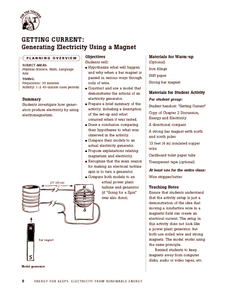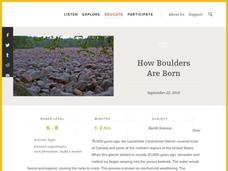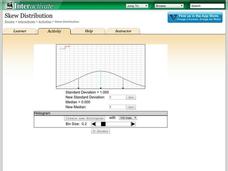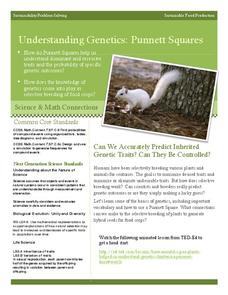Center for Learning in Action
Introduction to Matter
Begin your states of matter lessons with a demonstration designed to introduce the concept that all matter has properties. Reinforce this concept through vocabulary exploration, and the creation of atom models; salt, water, and carbon...
Curated OER
Invertebrate Diversity
Comparative anatomy prevails in the lesson exploring diversity among invertebrates. Biologists examine physical characteristics of an earthworm from phylum annelida and a meal worm from phylum insecta. They also inspect a cricket and a...
American Museum of Natural History
Bio-Benefits
Kick-start a discussion of the importance of biodiversity with a colorful resource that touts the benefits of maintaining healthy ecosystems. The images stress the interdependence of all the elements of an ecosystem.
US Institute of Peace
Responding to Conflict: Active Listening
Did I hear you right? You need a great instructional activity on active listening? Through large- and small-group activities, learners differentiate between poor and excellent listening skills. The resource, 7th in a series of 15,...
K12 Reader
Meteorologists
Meteorologists and the tools they use are the subject of a reading comprehension worksheet that asks kids to read the attached article and respond to a series of comprehension questions.
Cornell University
Bridge Building
Bridge the gaps in your knowledge of bridges. Individuals learn about bridge types by building models. The activity introduces beam bridges, arch bridges, truss bridges, and suspension bridges.
Food Project
Trace The French Fry
How does locally grown produce sold at a farmer's market compare to a more complex industrial system in the way they each affect the environment, people, and the economy? Pupils explore the different types of food systems and how they...
Code.org
HTTP and Abstraction on the Internet
Introduce your class to the layers of abstraction of the Internet with a lesson on the HTTP protocol. Pupils review previous lessons on levels of the Internet, then investigate new high levels by examining the HTTP traffic on...
Curated OER
Moon Mining
Go on a moon mining expedition from the safety of your classroom with this space exploration simulation. Using simple models of the moon's surface prepared ahead of time by the teacher, young scientists are challenged with locating and...
Energy for Keeps
Getting Current: Generating Electricity Using a Magnet
Give your class a magnetic charge with this creative experiment designed to teach emerging scientists about electromagnetism. Pupils construct a model that demonstrates the function of an electrical generator and test this creation in a...
US Navy
The Science of Diving
Introduce gas laws using the popular topic of SCUBA diving. This activity makes a connection between the gas laws and the effect of pressure and temperature changes during diving. Young engineers complete introductory experiments to...
Curated OER
Acid Rain
Create a simulation of acid rain in your classroom with lemon juice and bean plants to help kids study the effects of pollution on plants. In addition, learners will listen to a story and write responses based on guiding questions.
Beauty and Joy of Computing
Building Your Own Blocks
Isn't building with blocks an activity for toddlers? The third lab of a five-part unit teaches young computer scientists how to create their own block instructions for programming. They use these blocks to create geometric figures, spell...
American Museum of Natural History
Space Jell-O
Might as well learn about how space bends around massive objects while making dessert. A remote learning resource provides an opportunity for scholars to model how stars and planets bend space. They use Jell-O to represent space and...
Science Friday
How Boulders Are Born
Want your class to rock? Then try this boulder activity. Pupils learn about a specific boulder field and use edible materials to demonstrate the geological processes that formed this unique feature. Weathering, erosion, and mass...
NOAA
A Laboratory Simulation of Ocean Surface Currents
Stimulate interest in ocean currents with a simulation. The first installment of a five-part middle school series teaches future oceanographers about the forces that interact to cause ocean currents. A simulation shows how wind and...
Shodor Education Foundation
Skew Distribution
Slide the class into a skewed view. Learners alter the location of the median relative to the mean of a normal curve to create a skew distribution. They compare the curve to a histogram distribution with the same skewness.
Curated OER
Watercolor Landscapes
Van Gogh's Starry Night and Thomas Cole's The Oxbow are featured in a watercolor lesson plan that encourages young artists to explore various techniques before creating their own landscape.
NOAA
Tides
Low tides, high tides, spring tides, neap tides, diurnal tides, semidiurnal tides, mixed tides ... just how many types of tides are there? The 10th installment of a 23-part NOAA Enrichment in Marine sciences and Oceanography (NEMO)...
Western Kentucky University
Understanding Genetics: Punnett Squares
Can scientists really predict genetic outcomes or are they simply making a lucky guess? Scholars first learn about Gregor Mendel and how to make Punnett squares. Then they extract DNA from a strawberry in a lab with included conclusion...
Prestwick House
The Grapes of Wrath
At over 450 pages, John Steinbeck's Pulitzer Prize winning novel The Grapes of Wrath can be a challenging choice for full-class, book circle, or independent reading. The activities in a 10-page sample The Grapes of Wrath...
Curated OER
Objects in the Sky
Students explore what the sky looks like at different times. They identify objects in the sky and recognize changes over time. Students observe the sky and look for objects that are common in both the daytime and the nighttime sky.
Curated OER
Sky 4: The Moon
Students will draw the moon's shape for each evening on a calendar and then determine the pattern in the shapes over several weeks. Students' understandings should be confined to observations, descriptions, and finding patterns.
Curated OER
Sky 2: Shadows
students will explore making shadows and tracking the movement of an object over the course of a day to look for patterns. It is best to couple this shadow activity with reading the book, Bear Shadow, and making a map of Bear's...























